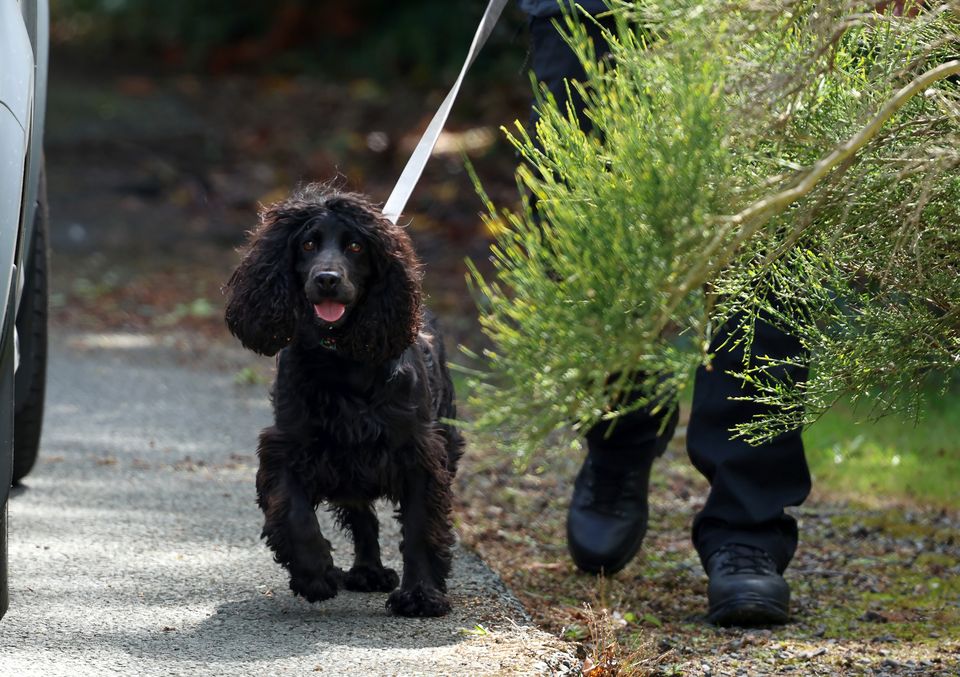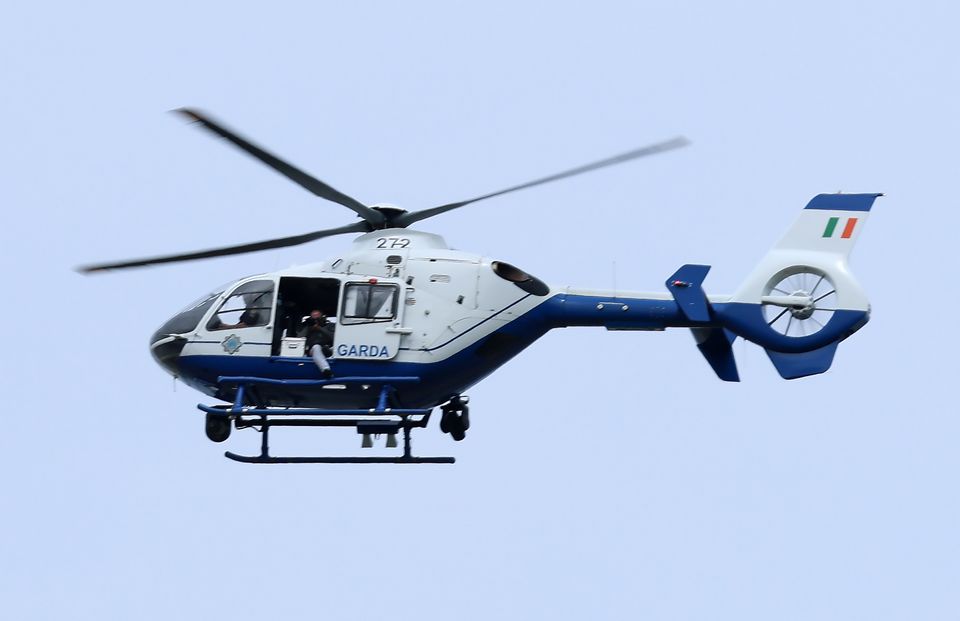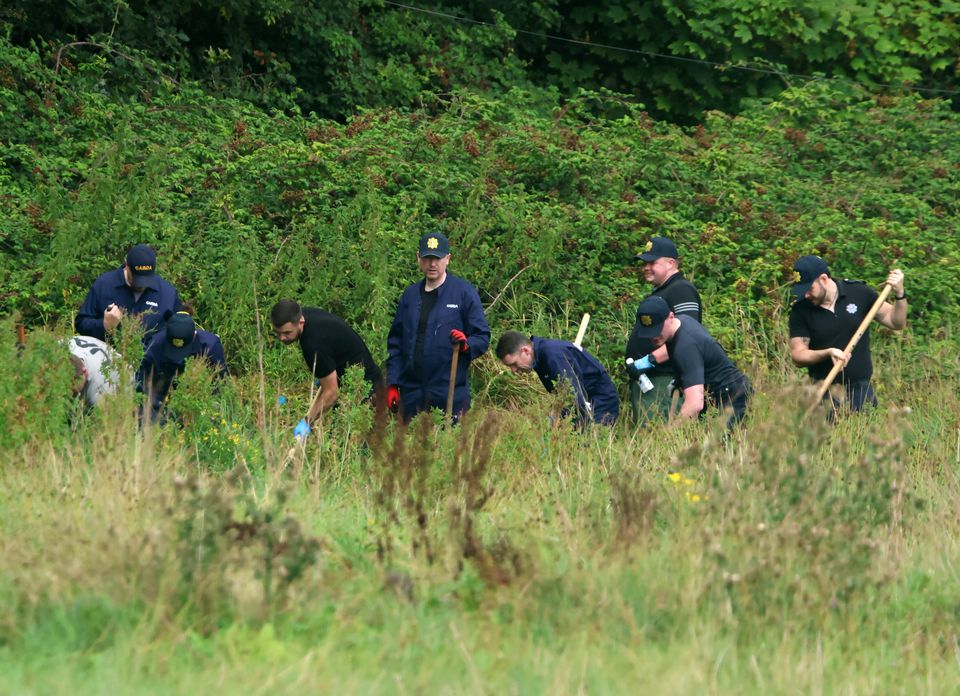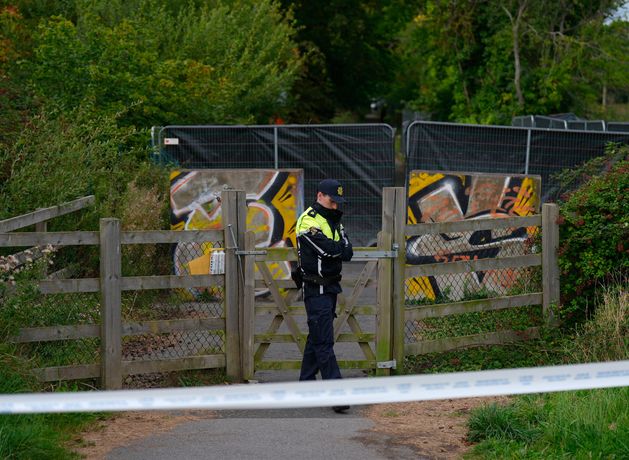It is understood that gardaí were also told that the boy’s remains were placed in a hold-all bag and those who carried his body walked about 3km away to bury him in the middle of the night.
However, as gardaí continue to widen their search in an area in Donabate in the hope of finding the boy’s remains, they have received conflicting statements regarding the death, and their probe may now take them to Brazil to interview his father.
The Sunday World has learned that in one account, officers were told that the three-year-old boy was “ice cold” in his bed and that he was placed into a bath of water in a failed attempt to revive him before his death was “concealed”.
The child’s mother, who lives in Dublin but is originally from Africa, and the boy’s Irish father, who lives in Brazil, have been fully co-operating with the garda investigation.
The couple had broken up but were still living together when their son is believed to have died.

A cadaver dog was brought in to help with the search. Photo: Collins
The boy’s father has spoken to gardaí about the circumstances of his son’s death, which both parents now maintain was from natural causes.
It is understood the child’s mother has been spoken to informally a number of times by gardaí based in Swords in north Dublin. Officers have been given “differing accounts” of how the boy died, including a version that stated he was killed.
However, both the boy’s mother and father “unequivocally” maintain that their young son died in his sleep from natural causes. Gardaí were told that he was buried in Donabate, around 3km from the apartment.
It is understood the parents of the boy, who would now be aged seven, gave him up for adoption when he was under the age of one.
They did so because they were living in “shared housing accommodation” and did not feel it was an appropriate place to raise a baby, it is understood.
However, the mother then had a “change of heart” and their child was returned to the parents around 18 months after being placed into state care with Tusla, the child and family agency.
Last Monday evening, a woman brought gardaí to the area where the child is said to have been buried.
The mother felt raising a baby in a shared accommodation situation was not the best start in life for her son
Without any remains, gardaí have no evidence to establish how the child died. A property in Donabate has also been searched.
In the nine days since gardaí were notified about the case, investigators have been building a picture of the boy’s short life.
He was born in 2018. His parents were living in “shared housing accommodation” in Dublin when the woman, now in her late 20s, became pregnant.
Not long after the boy’s birth, she made the decision to place him into care. This was done voluntarily, rather than by court order.
The mother felt raising a baby in a shared accommodation situation was not the best start in life for her son, so she contacted Tusla in order for him to first be fostered, with the eventual plan of having him adopted.

A garda helicopter surveys the search scene on Portrane Road, north Co Dublin last week. Photo: Collins
For 18 months, the boy lived with foster parents in Co Louth and in Northern Ireland, it is understood. However, his mother then had a “change of heart” and decided she wanted him returned.
Her living situation had changed. She now had an apartment of her own and felt she was in a better position to raise her son, along with her partner, the child’s father.
The boy’s father is from the west of Ireland. The couple met online when they both had moved to Dublin.
In 2020, their son was returned to them. It is always the aim of Tusla, the child and family agency, to “reunify” families where possible.
“Tusla recognises the importance of children living with their families, wherever possible. Tusla works with families to support them to ensure that children can remain at home where it is in the best interest of the child,” a spokesperson for the child and family agency said.
“However, if this is not possible, children may come into care for a period to ensure their safety and well-being. Whilst each case is dealt with on an individual basis, decisions to reunify children are made with careful assessment and consultation with parents, family, and professionals involved with the family.”
Tusla’s engagement with the boy appears to have ended as soon as he was returned to his parents in 2020. Gardaí suspect he died two years later.
A source said: “It is heartbreaking to consider the possibility that the boy might still be alive if he was never given back. We just don’t know how different his life could have been.”
Gardaí at Swords have established a number of facts since the case was raised with them on August 29.
The alarm was first raised within the Department of Social Protection, when an application for child benefit was submitted in recent months for the child. A quick database check confirmed that the boy was not registered at any school, so the department contacted Tusla to investigate.
The boy’s relatives had not seen him in a number of years
The child and family agency began to make its own enquiries. It was suggested to social workers that the boy was possibly living with relatives in the south of the country.
But when enquiries were made outside Dublin, it was established that the boy was not living there. In fact, his relatives had not seen him in a number of years.
At that stage, Tusla realised the boy was entirely unaccounted for and contacted gardaí.
“If the application for child benefit wasn’t made, no-one would know this child was missing, now presumed dead,” said a source. “Tusla and gardaí might never have found out.”
When contacted, garda headquarters said official figures show there are currently 59 children recorded as “missing, not found” across the country.
On the evening of August 29, gardaí arrived at the apartment in Donabate that the missing boy last called home. His mother co-operated fully with officers and provided them with her first statement. The next day, the boy’s mother provided another statement at Swords garda station. She also voluntarily provided a DNA sample and handed over her phone to gardaí.
By this stage the woman had been assigned a solicitor, Martin O’Donnell, of Morgan Redmond Solicitors in Swords. He declined to comment on the case when contacted by this newspaper.

Officers search an area of open ground on the Portrane Road in north Co Dublin last week. Photo: Collins
Neither parent was known to gardaí, and there is “no evidence” that the young boy was growing up in an unsafe environment before he disappeared.
Gardaí were initially optimistic that his remains would be found within days of the search getting under way last Monday. But his body remains undetected and specialists have expanded their search of the area in recent days.
A cadaver dog brought to the scene yielded nothing. Modern forensics are so advanced that in the event the child’s body is recovered, gardaí are optimistic a cause of death could be determined, even four years on.
Finding the boy’s remains is the main priority of gardaí and will determine the direction of the investigation.
It is a criminal offence to not report the death of a child, and to bury a child without notifying the authorities. It is also a crime to make a fraudulent welfare claim. None of these offences, if proven, carry potential lengthy jail sentences.
Senior gardaí have also been mulling over the possibility of releasing the child’s name and his photo.
It could well come to a stage where this boy is identified. He has a name and deserves to be remembered
“It has to be decided if that is helpful operationally to the investigation. What would it achieve?” asked a senior source. “This is very different to the Kyran Durnin case in Drogheda, where we were trying to jog memories of people who might have seen that little boy before he died. This is a more closed situation. But it could well come to a stage where this boy is identified. He has a name and deserves to be remembered.”
The search for the boy’s body continued over the weekend.
The case is separate from that of the search for Kyran Durnin in Louth, who has been feared murdered.
In that case, gardaí are analysing “thousands of hours” of digital evidence seized from three properties during searches for Kyran’s remains.
.jpg)
A garda at the scene of the site in Donabate, Co Dublin, where a search has been carried out for a missing boy. Photo: PA
News in 90 seconds – 8th September 2025
Last December, a man and a woman were arrested for questioning on suspicion of murder, but were released without charge.
The arrested man strongly denied any involvement in Kyran’s death. Days after being questioned and released, he died by suicide.
Kyran, who would be nine years old this year if still alive, was reported missing in August 2024 and a murder investigation was launched in October.
Gardaí believe he might have died aged six after it emerged he had not been seen since May 2022, when he was a pupil at a primary school in Dundalk.
Kyran’s mother Dayla, who was later tracked down in the UK, has been interviewed by detectives, but has been unable to shed light on her son’s whereabouts.

